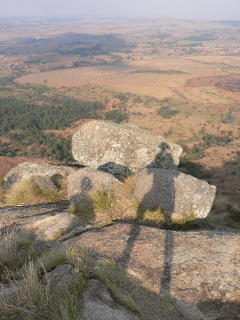Swaziland
 On Friday afternoon a friend from work, Camilla, and I rented a car and drove five hours to a wildlife sanctuary in Swaziland. There we met up with about a dozen others, mostly from France (working at the Embassy, and for Pugeot) who had invited us to join them by way of the group email lists I found myself on within a few days of arriving at work.
On Friday afternoon a friend from work, Camilla, and I rented a car and drove five hours to a wildlife sanctuary in Swaziland. There we met up with about a dozen others, mostly from France (working at the Embassy, and for Pugeot) who had invited us to join them by way of the group email lists I found myself on within a few days of arriving at work.Swaziland, my Lonely Planet tells me, is an absolute Monarchy. The king who preceded the current one is considered to be the father of the nation (and that's not simply a figure of speech - he had 120 wives, and that was just the official number): in the first half of the 20th century he managed to hold off Afrikanner farmers and soldiers long enough for the British to step in and annex the country, and although much valuable land was still whittled away by both British and Afrikanner, the country remained intact and was given its independence in 1968. Today Swaziland has the third highest rate of AIDS/HIV infection in the world: 34%. Life expectancy is 33 years, and one quarter of the population is expected to be dead by 2010. Going to the country doesn't make these numbers any easier to grasp, as (to my untrained eye, at least) they are unobservable and, (disturbingly?) left no impression on the traveller. I only saw one sign during the weekend that AIDS might even be an issue in Swaziland: A "don't do it naked" poster in the immigration building.
What DID leave an impression, on the other hand, was the friendliness of the people, and the beauty of the country. South African cities makes you nervous, there's no getting around it (I'm told that outside the cities it's different), and driving through the night on an at-times shoulderless road dotted with the odd "Highjacking Hotspot, Do Not Stop" sign did little to sooth the nerves. It was therefore a much appreciated change to spend the weekend in the outdoors hiking, relaxing, wildlife watching, barbequeing (the verb here is actually "Braai") and making friends. The Mlilwane Reserve is the first protected area in Swaziland. Originally a game reserve established by a conservationist named Ted Reilly 50 or 60 years ago, it is still privately owned today. Mlilwane (Mm-Lil-Wah-Ney) means "Little Fire," refering to the many fires that are started by lightening in the area.
Highlights: Seeing Zebra - these excited me the most, for some reason; Fat Bastard Shiraz - terrible name, great taste; getting hot and tired hiking in the sun all day; sitting around the fire listening to the wildlife in the night; and the French.
Personal speculations on animal behaviour: I have deduced from observation that Hippos must once have ruled the earth, reaching population densities comparable to those of humans in places such as Singapore and Bangladesh today. At that time they evolved to tolerate a complete absence of personal space - a genetic trait that has survived to the present day.
My evidence: the Hippos at Mlilwane, despite an entire lagoon and surrounding reserve at their disposal, spent the entire day sharing a tiny "island." Not only were they unable to move around, or change their position in any way, they even had to take it in turns standing in the water as the space was not enough to accomodate them all.
Go here for more photos: http://ca.pg.photos.yahoo.com/ph/philipkakins/album?.dir=/4a0b


0 Comments:
Post a Comment
<< Home